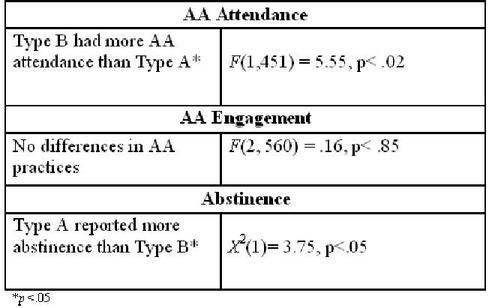The DRAM, Vol. 2(9) – Examining AA participant typology: Who does AA help?
Alcoholics Anonymous (AA) is one of the best known fellowships for those who have experienced drinking related problems. Research shows that attending AA meetings is related to short term as well as long term abstinence (Kaskutas et al., 2005; Moos & Moos, 2006). Following these findings, researchers are examining factors that relate to AA attendance. This week’s DRAM reviews a study by Tonigan, Bogenschutz, & Miller (2006), which examined how a drinking typology relates to AA attendance and AA related behaviors.
The investigators used Project MATCH’s (P.M.R.G., 1997) samples of aftercare and outpatient clients (N=454). The researchers assessed participants before treatment, at the end of treatment, and every three months post treatment for a year. Assessments included AA attendance, alcohol abstinence, and the Alcoholic Anonymous Inventory (AAI), which measures AA beliefs and behaviors. Participants also answered demographic questions. The researchers classified participants into two drinking typologies: Type A (less impaired drinkers) and Type B (more impaired drinkers). The investigators used the MacAndrew Alcoholism score and the Physical Consequences of Drinking index to help group participants by typology. The researchers used two repeated measures multiple analysis of covariance (MANCOVA) to assess the differences between Type A and Type B participants regarding their AA attendance and engagement (i.e., AA beliefs and behaviors). The investigators used stepwise logistic regression to measure whether typological differences could predict one year abstinence rates.

Figure. Differences between Type A and Type B AA participants for AA attendance, AA engagement, and abstinence at 12-month follow-up (N = 454). Click image to enlarge.
The investigators classified 57% of the participants in the Type A group. Type B participants attended more AA meetings than Type A participants across the 12 month follow-up (see Figure). However Type A participants and Type B participants did not report significantly different AA beliefs and practices. In addition, 30.3% of Type A participants reported abstinence for at least one year, while 25.3% of Type B participants reported abstinence for a year.
One limitation of the study is how the researchers classified the participants. The impairment drinking typology employed in this study might not provide the best classification strategy, be the only way to subgroup AA participants, or to predict AA attendance and affiliation. Other factors like religiosity, access to social networks, and belief systems might add strength to our ability to predict AA attendance and affiliation.
Still, this study provides insight about the relationship between participant typologies and AA. Although, Type B participants had higher AA attendance than Type A participants, Type A participants reported more abstinence than Type B participants. Yet, Type A and Type B participants were similarly engaged in AA beliefs and practices. Further research needs to assess the validity of this drinking typology among AA participants (i.e., impairment) and compare it to alternative strategies. In addition, future studies should measure additional AA participant characteristics to determine how these variables might relate to AA affiliation and abstinence.
—Sarbani Hazra
What do you think? Please use the comment link below to provide feedback on this article.
References
Kaskutas, L. A., Ammon, L., Delucchi, K., Room, R., Bond, J., & Weisner, C. (2005). Alcoholics Anonymous Careers: Patterns of AA Involvement Five Years after Treatment Entry. Alcoholism: Clinical and Experimental Research, 29(11), 1983-1990.
Moos, R. H., & Moos, B. S. (2006). Participation in Treatment and Alcoholics Anonymous: A 16-Year Follow-Up of Initially Untreated Individuals. Journal of Clinical Psychology, 62(6), 735-750.
P.M.R.G. (1997). Matching alcoholism treatments to client heterogeneity: Project MATCH posttreatment drinking outcomes. Journal of Studies on Alcohol, 58, 7-29.
Tonigan, J. S., Bogenschutz, M. P., & Miller, W. R. (2006). Is alcoholism typology a predictor of both Alcoholics Anonymous affiliation and disaffiliation after treatment? Journal of Substance Abuse Treatment, 30(4), 323-330.